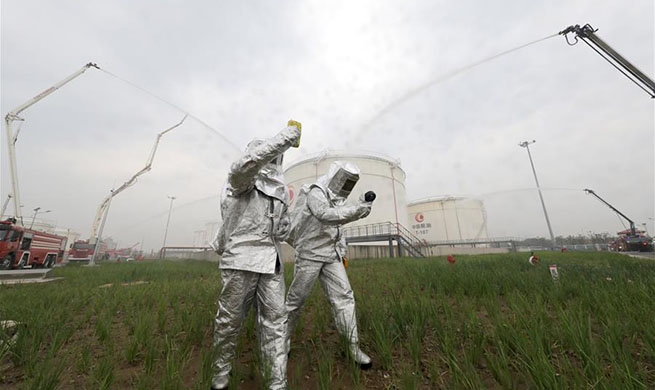by Maria Spiliopoulou, Angelos Tsatsis
ATHENS, July 9 (Xinhua) -- Greece's new government, which was sworn in on Tuesday, should give with no delays boost to reforms and investment to accelerate growth, according to local experts.
Sunday's general elections, the first held since the country emerged from the bailout era last summer, gave a strong mandate to the conservatives to form a stable single party administration and implement their program to rejuvenate Greece, Panagiotis Petrakis, Professor in the Department of Economics at the National and Kapodistrian University of Athens, told Xinhua.
In the economy, over the past two years the country has already entered the path of growth, aligning with the rest of European economies, but is still at low rates, he said.
Greece's annual GDP growth slowed down in the first quarter of 2019 compared to the previous three quarters, recording a 1.3-percent increase, compared with 1.5 percent and 2.1 percent in the previous two quarters, according to the latest report released by the country's statistical agency, the Hellenic Statistical Authority (ELSTAT).
"Greece needs a much more generous movement towards an increased number of rates of growth. In order to do so you have to give a chance again to a huge program of new reforms that the economy desperately needs. For instance, change the way that the justice system is working and make shorter the delays in the courts concerning the investments in Greece," Petrakis explained.
"If those things happen and happen fast, that is if you give a boost to reforms and to investment and to give them an opportunity during the next six months, then we can hope that by the end of 2020 we could observe higher rates of growth and I think that this is the hope that is connected with the rise of the new government," Petrakis stressed.
Andreas Yannopoulos, founder of InvestGr forum, a platform bringing together in the past two years officials, company executives and academics, to discuss proposals about making Greece an attractive investment destination, shared this view.
Sunday's outcome marks a new period for Greece economically and politically, he said.
"Obviously there are high expectations of the new government. However, although significant progress has been achieved in recent years, the problems are still huge for Greece, on national and international level," he stated, adding that there should not be waste of time.
"I believe that the new government should proceed immediately in the next 3-4 months to important decisions and reforms so that domestic and foreign investors receive strong messages," Yannopoulos said.
On the sidelines of the swearing in ceremony at the Presidential mansion and during handover ceremonies at the ministries, Greece's new Prime Minister Kyriakos Mitsotakis and ministers reiterated on Tuesday their determination to move fast to bring change.
Yannopoulos said the new government must listen to what all stakeholders involved in Greece have stated repeatedly and that they need to break eggs.
"Reforms are necessary to make the country more friendly to entrepreneurism and investments," he said.
"They should look at taxation issues, see what they can do regarding the justice system, focus on research and innovation and give incentives to young people who left the country in recent years in order to come back to Greece," Yannopoulos said, outlining some of the topics that need to be addressed.
Ten years after the outbreak of the debt crisis which brought the country at the brink of bankruptcy and after the implementation of three harsh bailout programs that kept her afloat and in the eurozone, many financial indexes look good, but chronic, structural shortcomings are still here. Greece still lags on crucial reforms to build a healthy economy with sustainable growth.
Inaction is one of the key factors that may undermine the new government's ambitious agenda, he warned.
"The challenge is to overcome the inaction of recent years, which we observed during the previous government's term, but also their predecessors'. I will say this again, that they should address critical issues, such as taxation, and ensure financial, political and social stability," Yannopoulos said.
"It is very important for the next day -- and at this point lie also the responsibilities of the entire opposition -- to maintain a responsible stance towards any reforms which will be put forward so that there will be no turbulence like the ones we witnessed in particular in the early years of the crisis," he said.
According to Yannopoulos, at that time Greece gave very negative messages through the images of a burning Athens with crowds screaming in front of the parliament. "Such scenes did enormous harm to the country's image as an investment destination," he added.













